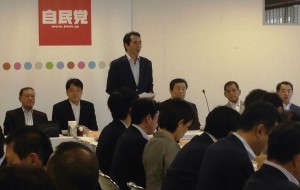
Liberal Democratic Party members opposed to the Trans-Pacific Partnership free-trade talks hold a meeting on Wednesday, July 22, as the negotiations enter the final stage
As the ministerial meeting of the Trans-Pacific Partnership free-trade talks approaches, Liberal Democratic Party members who are opposed to the TPP scheme gathered on Wednesday, July 22, to press the government not to rush to come to terms with other negotiators and to place top priority on protecting the key agricultural products. They asked that the group’s new statement to be submitted to the government include what is adopted by the party and the Diet committees, the stance that Japan is ready to withdraw from the negotiations if key farm items cannot be protected. They criticized the government’s eagerness to conclude the talks amid growing concerns among farmers.
“If (the Japanese government) appears too eager to conclude the talks this time, (other member countries) will take advantage of it and pressure Japan to make further concessions,” Taku Eto, head of the group, said, expressing concern over the government which is aiming at reaching broad agreement on the TPP framework at the ministerial meeting expected on Tuesday, July 28.
Akira Amari, minister in charge of the TPP talks, regards the end of this month as the deadline for the TPP negotiations and is determined to reach agreement even if it means leaving out some countries which are behind in negotiating. However, it is unclear whether the member nations can settle the talks at the ministerial meeting, as Canada is delayed in negotiations, while New Zealand refuses to relax its extremely high standard for trade liberalization and the United States continues to demand Japan to expand non-tariff import quota for table rice. Negotiation sources say it would be difficult for the members to reach agreement also on the controversial area of rules, including intellectual property rights, unless the U.S. makes a major concession.
Takeshi Noda, head of the LDP’s Tax System Research Council who attended the gathering, stressed that the government is not the one to judge whether the agreement to be made under the TPP scheme is in line with the Diet resolutions, and showed concerns over the government’s stance of trying to hastily advance negotiations together with the U.S. Ken Saito, director of the party’s agriculture and forestry division, also said that the TPP talks could be made into a divisive political issue in the U.S. presidential election. “Even if a TPP agreement is reached, it may not be approved (by U.S. Congress). If (Japan) compromises, it may be forced to compromise further in the future,” Saito warned.
Many participants said the group should clearly state the government should be ready to withdraw from the talks if key agricultural items cannot be protected. “This group was originally established to demand that the government immediately retract its intention (to participate in the TPP talks),” said Upper House member Shoji Nishida. “It is our last stand. If we don’t become serious, we will be swept away and everything will be over,” Nishida said, followed by an applause.
Others spoke on behalf of farmers who are worried that the TPP negotiations are nearing an end. Lower House member Yoshitaka Ito said dairy farmers are abandoning their business one after another, and half of them give as a reason concerns for the future due to the TPP. Another Lower House member Norikazu Suzuki said farmers are shocked to see press reports that Japan is proposing expanding rice imports in the negotiations when rice prices might continue to remain sluggish this year. Upper House member Ryosuke Kozuki said farmers are watching the negotiations breathlessly, as they can’t see what is going on behind the doors.
(July 23, 2015)

